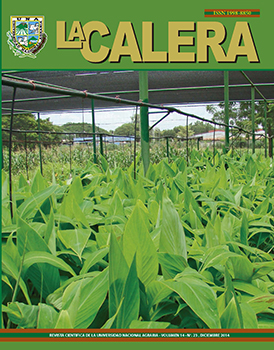Soil fertility with agroecological practices and conventional cultivation management in coffee crop
DOI:
https://doi.org/10.5377/calera.v14i23.2660Keywords:
Agroecology, sustainability, soil fertility, biodiversityAbstract
The implementation of agroecological practices in coffee plantations (Coffea arabica L.), is critical for the maintenance and enhancement of soil fertility and the sustainable management of the system. The study was conducted from June 2009 to January 2010 at two sites, the Jardín Botánico and the Campos Azules Experimental Centre, in Masatepe, Nicaragua. Both places are located between the coordinates 11°54’’ north latitude and 86°09’’ west longitude. The purpose was to evaluate the effect of two agroecological practices and a conventional cultivation management practice on the physical, chemical and biological fertility of the soil in coffee plantations. A univariate arrangement was used in a Randomized Complete Blocks (RCB) design with three replicates. The variables were bulk density, porosity, water retention, organic matter, total nitrogen, organic carbon, pH, cation exchange capacity, soil´s macrofauna diversity, quantification of bacteria and fungi. There are no differences between the components of physical and chemical soil fertility; however, systems with agroecological practices showed higher porosity and moisture retention, and lower bulk density; and higher values of organic matter, cation exchange capacity, organic carbon, total nitrogen and pH. No difference was recorded in bacteria populations, but higher populations of fungi in the conventional management in the rainy season. The cumulative yield of coffee did not differ between the systems evaluated, but there is a trend of increasing in agroecological systems and even outperform the conventional management. The results suggest that the implementation of agroecological practices substantially contributes to the overall soil fertility.
La Calera Vol.14 No.23, 2014, pp.67-75
Downloads
4129

